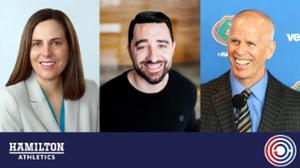Competing Interests
A Conversation on the Future of College Sports
Background
Several landmark lawsuits ruling in favor of student athletes have opened the door for athletes at powerhouse schools to make money from their name, image, and likeness (NIL) and share-in athletic department revenues. College rules and state laws are constantly evolving regarding NIL, player unionization, and whether players should be considered employees.
As collegiate athletics shifts from amateurism to a pay-for-play model, the future of broad-based athletics programs is uncertain. Questions loom about gender equity and Title IX mandates, the impact on Division III athletics, and the financial sustainability of college sports. Common Ground presented this conversation to discuss the future of college sports and the competing interests surrounding athlete pay.
In this crucial time in college athletics, (AO) is giving athletes a voice and a "seat at the table." AO is pioneering a players association for college athletes [across all sports and levels] to unite, vote, and address vital issues with their voice:
- The future of college athletics is currently being written. AO is invested in making sure that athletes have the support they need to navigate it, maximize their experience, and have a voice in what that future looks like. This is a pivotal moment in the history of sports. AO is the bridge to seat college athletes and college athletics leaders at the same table to create an equitable deal as the solution for the future of college athletics.
- AO Chapters also serve to establish the sport & conference-focused group licenses needed to generate legitimate NIL deal volume for specific groups of college athletes – these group licenses are also a path toward media and other revenue sharing in the future.
AO is not a union for several reasons, starting with the fact that college athletes are not currently employees.
There has never been a more pivotal moment for college athletes, with cases like House v. NCAA, Johnson v. NCAA, and several cases involving the National Labor Relations Board (NLRB). These cases address issues such as college athlete employment status, revenue sharing, post-grad medical coverage, etc.
AO has also added several key leaders to its Board of Directors, including Hall of Fame Athletic Director Sandy Barbour and Hall of Fame Basketball Coach Jim Boeheim.
The purpose of the Knight Commission on Intercollegiate Athletics is to develop, promote and lead transformational change that prioritizes the education, health, safety and success of college athletes.
The Knight Commission on Intercollegiate Athletics is an independent group with a legacy of leading reforms that strengthen the educational mission of college sports.
The John S. and James L. Knight Foundation formed the Commission in October 1989 to recommend a reform agenda in response to highly visible athletics scandals and low graduation rates for college football and men’s basketball players that threatened the integrity of higher education.
The Commission is composed of current and former university presidents and chancellors, university trustees and former college athletes, as well as nationally-regarded thought leaders from organizations with ties to or involvement in higher education or college sports.
In an effort to strengthen financial transparency and inform policy development, the Knight Commission produces resources about the finances of Division I college sports programs, the NCAA, and the College Football Playoff. The Commission partners with Syracuse University’s S.I. Newhouse School of Public Communications to produce the .
Additional Resources
Contact
Common Ground

